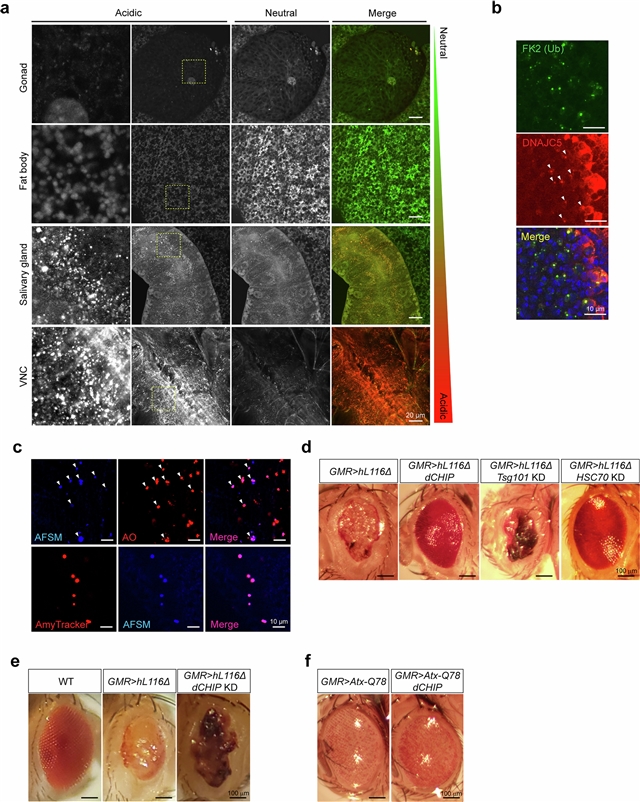
美国国立卫生研究院叶一泓团队发现了CHIP保护溶酶体免受CLN4突变体诱导的膜损伤。2025年8月25日,国际知名学术期刊《自然—细胞生物学》发表了这一成果。
在这里,课题组生成并表征了诱导多能干细胞(iPSC)衍生的神经元(i3Neuron)携带蜡样脂褐素沉积神经元4(CLN4)相关的DNAJC5突变,这表明突变神经元中存在广泛的溶酶体异常。体外膜损伤实验证实,溶酶体相关的CLN4突变体聚集体造成的溶酶体损伤是CLN4相关神经退行性变的关键致病关键。有趣的是,在非神经元细胞中,泛素依赖的微自噬机制下调CLN4聚集以抵消CLN4相关的溶酶毒性。
全基因组CRISPR筛选鉴定出Hsc70相互作用蛋白(CHIP)的泛素连接酶羧基末端是一种中心微自噬调节因子,赋予泛素依赖性溶酶体保护。重要的是,CHIP的溶酶体保护功能是可转移的:在果蝇CLN4疾病模型中,异位CHIP改善了CLN4 i3神经元中的溶酶体功能,并有效缓解了脂褐素积累和细胞死亡。他们的研究证实了CHIP介导的微自噬是保持溶酶体完整性的关键细胞器守护者,为溶酶体相关神经退行性疾病的治疗发展提供了新的见解。
研究人员表示,了解细胞如何减轻溶酶体损伤对于揭示溶酶体相关疾病的致病机制至关重要。
附:英文原文
Title: CHIP protects lysosomes from CLN4 mutant-induced membrane damage
Author: Lee, Juhyung, Chin, Natalie, Zou, Jizhong, Mazli, Wan Nur Atiqah Binti, Jarnik, Michal, Saidi, Layla, Xu, Yue, Jeong, Eutteum, Suh, Jessica, Replogle, John, Ward, Michael E., Bonifacino, Juan S., Zheng, Wei, Hao, Ling, Ye, Yihong
Issue&Volume: 2025-08-25
Abstract: Understanding how cells mitigate lysosomal damage is critical for unravelling pathogenic mechanisms of lysosome-related diseases. Here we generate and characterize induced pluripotent stem cell (iPSC)-derived neurons (i3Neuron) bearing ceroid lipofuscinosis neuronal 4 (CLN4)-linked DNAJC5 mutations, which revealed extensive lysosomal abnormality in mutant neurons. In vitro membrane-damaging experiments establish lysosomal damages caused by lysosome-associated CLN4 mutant aggregates, as a critical pathogenic linchpin in CLN4-associated neurodegeneration. Intriguingly, in non-neuronal cells, a ubiquitin-dependent microautophagy mechanism downregulates CLN4 aggregates to counteract CLN4-associated lysotoxicity. Genome-wide CRISPR screens identify the ubiquitin ligase carboxyl terminus of Hsc70-interacting protein (CHIP) as a central microautophagy regulator that confers ubiquitin-dependent lysosome protection. Importantly, CHIP’s lysosome protection function is transferrable: ectopic CHIP improves lysosomal function in CLN4 i3Neurons and effectively alleviates lipofuscin accumulation and cell death in a Drosophila CLN4 disease model. Our study establishes CHIP-mediated microautophagy as a key organelle guardian that preserves lysosome integrity, offering new insights into therapeutic development for lysosome-related neurodegenerative diseases.
DOI: 10.1038/s41556-025-01738-2
Source: https://www.nature.com/articles/s41556-025-01738-2
Nature Cell Biology:《自然—细胞生物学》,创刊于1999年。隶属于施普林格·自然出版集团,最新IF:28.213
官方网址:https://www.nature.com/ncb/
投稿链接:https://mts-ncb.nature.com/cgi-bin/main.plex
